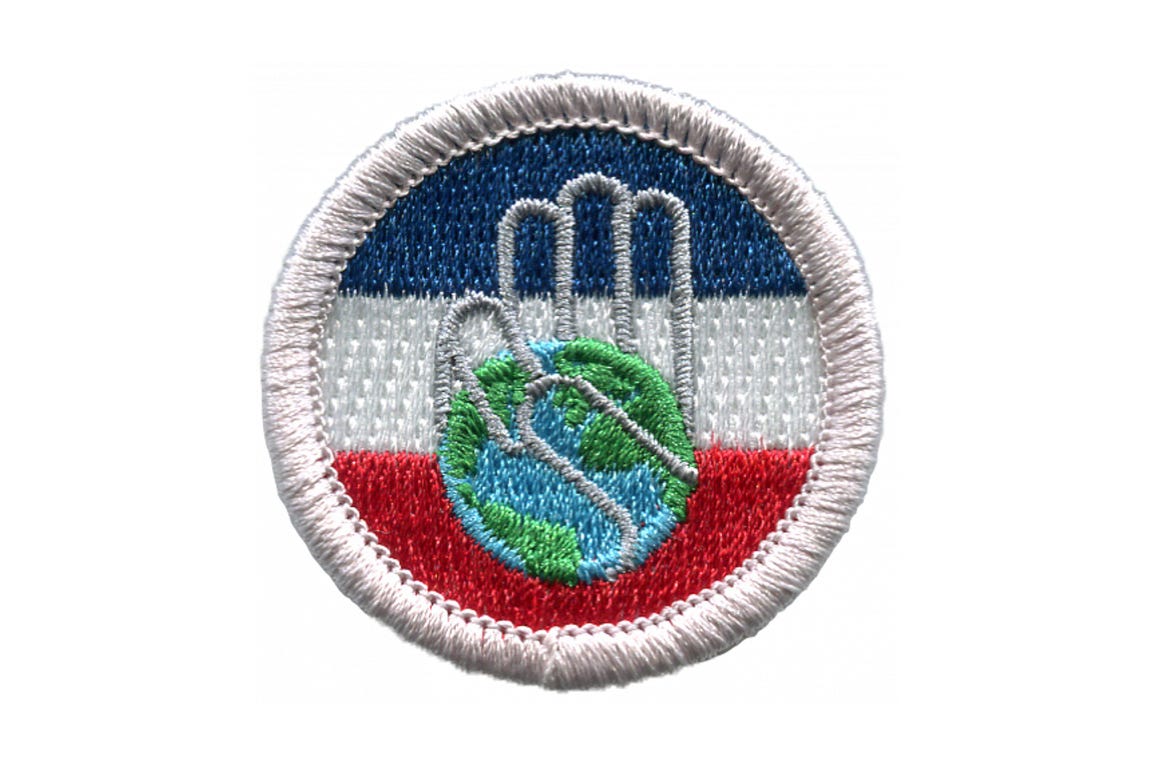BSA releases new "Citizenship in Society" merit badge focused on diversity, equity and inclusion
The badge does not come with a pamphlet, and instead "encourages a self-guided ... approach to learning.” Here's what you need to know about it.
Hello, readers. I’m popping into your inbox early this week to address the release of the much-anticipated "Citizenship in Society" merit badge, which came out this morning. Here’s a brief rundown of what’s in it, and what people think about. Check back later for additional updates/perspectives.

The Boy Scouts of America has officially released the requirements for its new "Citizenship in Society" merit badge, the evolution of the diversity, equity and inclusion badge that the BSA promised to create in the summer of 2020.
The requirements for the badge are available here, and the counselor guidelines are available here. Scouts may begin working toward the badge as of today, and starting July 1, 2022, the merit badge will be required for Eagle Scouts.
There is no pamphlet for the badge, which the BSA says is meant to “encourage a self-guided/self-exploration approach to learning.” The counselor guidelines note that the badge will “require a Scout to do their own research and to dig as deeply and as detailed as the Scout desires,” which seems to leave considerable leeway in how the badge will play out. “We intentionally chose this approach as we want to encourage each Scout to explore information that is most relevant/most interests them to help optimize their learnings,” says a BSA fact sheet about the new badge.
Notably, there is hardly any mention of LGBTQ+ identities in the badge materials. Under a definition of “identities,” the badge gives the following examples: “Race - Ethnicity - Gender - Age - Financial background - Mental and/or physical health and abilities - Religious or ethical values system - National origin - Language group.”
The phrase “sexual orientation” appears once in the counselor guide, under a definition of discrimination: “People may be discriminated against on the basis of race, gender, age, religion, or sexual orientation, as well as other categories.” The words “gay, queer, LGBTQ or trans” do not appear anywhere in either the counselor guide or scout requirements.
To be sure, the merit badge does ask scouts to understand diverse identities, but does not specify which ones. (This is meant to avoid “prescribed approaches or ideologies.”) The examples given throughout the text focus on more generic instances bullying that might happen at a campout or in a school setting. This is a significant departure from the original vision for the badge, which was meant to include an entire section on LGBTQ+ identities, for example.
So, what does the badge include? The requirements prompt scouts to consider ethical decision making, what it means to help others who may seem different from them, how create a welcoming environment in their Scouting unit, and to learn from an individual who has made progress on DEI, among other things.
Alison Batey, founder of the LGBTQ+ Scouts and Allies Facebook group and a professional scouter, said the level of DEI knowledge that scouts will likely take away from the new merit badge will vary widely based on who is teaching it.
“There’s no deep dive into some of these harder conversations unless you have a counselor who makes a choice to take a deep dive into those harder conversations,” Batey said. She plans to start teaching the badge as early as this weekend, and hopes to make the most of its sparse requirements.
“I really want this to be an opportunity for critical thinking about the information [scouts] take in. And the badge could have been, [but] it allows them not to think critically in some cases,” Batey said, referring to the lack of specific content in the badge.
She was also disappointed that the badge makes no mention of unconscious bias, or of the BSA’s own shortcomings when it comes to diversity, equity and inclusion.
Reactions to the release of the merit badge on Facebook were mixed. Some expressed frustration with the format of the badge: “Way too much leeway,” said one commenter, and “This is a VERY watered down version of the original Diversity merit badge and VERY disappointing!” said another. Some called it a “joke” and an “embarrassment.” Others protested its existence at all, with one commenter saying it “promotes divisiveness” and others questioning what it added beyond the existing citizenship badges.
The BSA’s chief diversity officer and vice president of diversity and inclusion Elizabeth Ramirez-Washka, who led the creation of the badge, did not immediately respond to a request for comment.
What do you think of the new badge? Feel free to share your thoughts below in the comments.




It will do a good job to force a scout to consider the issues and ramifications. It does not need to cover every aspect, as that is something the scout will learn and experience over their lives. Having the knowledge of it in advance helps.